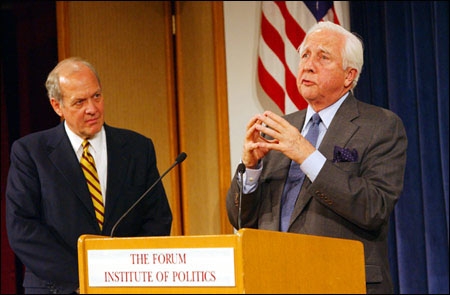“We’ve been through worse…”:
Historian David McCullough on the uses of history in a time of crisis

The idea that history has something valuable and useful to teach us has been seriously questioned by academic historians in recent years, and a new and often bewildering set of theories justifying the historical enterprise has been proposed in its stead.
David McCullough, winner of two Pulitzer Prizes for history, whose biography of John Adams is now in its 34th printing, is plainly not one of those who feels the need to shift the craft of history writing onto new theoretical foundations.
That much was clear merely from the title of his Theodore H. White Lecture delivered Tuesday night (Oct. 29) at the Kennedy School’s ARCO Forum – “A Sense of History in Times of Crisis.” The talk was sponsored by the Joan Shorenstein Center on Press and Politics.
McCullough, who spoke without notes except for a copy of his Adams biography from which he occasionally read a quotation, gave a rambling, vivid talk filled with observations and anecdotes about America’s greatest political leaders. Not surprisingly, most of them concurred with McCullough’s thesis that the reading of history is a useful and edifying activity.
According to McCullough, many U.S. presidents in times of crisis have consulted history for its instructive qualities. When Harry Truman, an ardent student of history, was preparing to fire Gen. MacArthur, he read about what Lincoln had undergone when he decided to dismiss Gen. McClellan. The reading helped him through the ordeal.
John F. Kennedy, during the Cuban Missile Crisis, expressed a wish that every officer in the armed forces read Barbara Tuchman’s “The Guns of August” about the events that brought on World War I, in the hope that this knowledge might help prevent another world conflagration.
These leaders were “calling up historical analogies and historical sources of strength,” McCullough said.
The past is not only a source of instruction, but it has made us what we are. All of us are the products of our parents, teachers, and friends, as well as of the writers, artists, and other public figures who have had a hand in shaping our minds and characters.
“There’s no such thing as a self-made man,” he said.
For example, without understanding the impact of the play “Cato” by Joseph Addison, it is impossible to understand the thoughts and feelings of the generation that fought the American Revolution. When Nathan Hale was executed by the British in 1776, his famous last words – “My only regret is that I have but one life to give for my country” – were a quotation from Addison’s play.
And yet, paradoxically, “There is no such thing as the past,” McCullough said. “Adams and Jefferson didn’t go around saying, “Isn’t this fascinating, living in the past? Aren’t we quaint in our funny clothes?’ They lived in the present, but it was a present that was different from ours. They perceived reality and the world differently from the way we do.”
The world of the past is often difficult for us to imagine. Evoking the image of Abigail Adams working long hours to maintain home and family and then sitting down by candlelight to write long letters to her husband in Paris or Philadelphia, McCullough said, “We have no idea how difficult and hard life was then.”
But the difficulties Americans have been through can be a source of strength.
“The point I’d like to make is that a great deal about the United States has changed since September 11, but everything hasn’t changed. One thing that hasn’t changed is our history. It is still an inexhaustible source of strength and guidance.”
McCullough said that while the terrorist attacks on America were a terrible thing, they were not the worst the country has suffered. The Civil War, the influenza epidemic of 1918 in which 500,000 people died, the Great Depression, the early days of World War II in which America’s crippled Navy could not respond to attacks by German submarines – these were worse by far.
“This is not the worst we have ever been through by any means. We must understand that if we are to stand up to what we have to face.”
McCullough ended his talk with an anecdote, not about an American leader but a British one, Winston Churchill, who had crossed the Atlantic in the winter of 1941 to consolidate U.S. support in the struggle against the Nazis.
“He made a great speech in which he said these words: “We haven’t come this far because we’re made of sugar candy.’ And Churchill wasn’t just a great world leader – he was a historian!”




